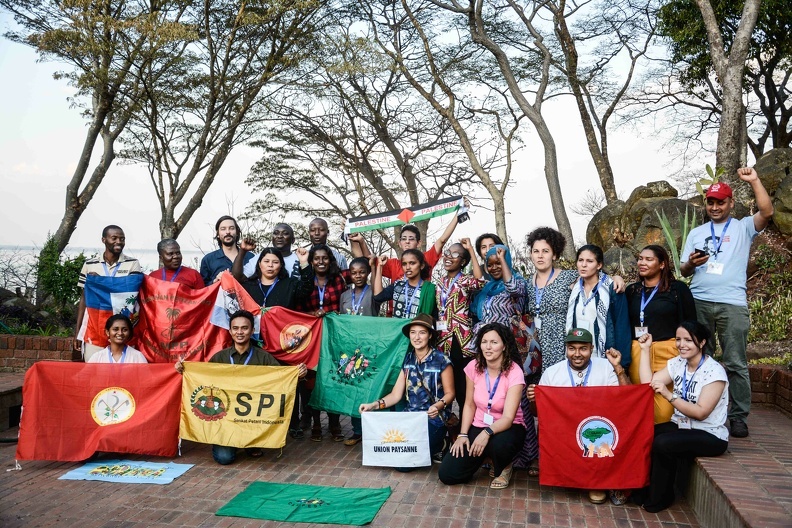World Food Forum: Peasant Youth from La Via Campesina calls for agrarian reform and food sovereignty

Peasant delegates from La Via Campesina’s Youth Articulation spoke at the Young Farmers’ Round table held during the 04th and 05th of October at the World Food Forum. The forum was organized by the Food and Agriculture Organization of the United Nations (FAO) and the family farmers organizations working on implementing the United Nations Decade of Family Farming (UNDFF 2019-2028).
Speaking from Nepal, Pramesh Pokharel of the All Nepal Peasants’ Federation and International Coordination Committee(ICC) member of La Via Campesina said,
“The average age of farmers in many countries is increasing, and neoliberal policies in developing countries negatively impact agriculture. Agriculture seems not to be the choice of youth. Transformation in the political, economic, socio-cultural system and transformation in agriculture is not possible without youth. In this context, the Young Farmers’ round-table – for youth support and the generational sustainability of family farming bears great significance. The decade of Family Farming is a space and opportunity for us to promote agroecology and the value of the family farm. But we have to be careful about the hijack of the family farm model by companies, foundations, and big farms against the Food Sovereignty principle. The decade of family farming should uphold the principle of food sovereignty and the UN Declaration of peasants’ rights and other people working in rural areas (UNDROP).”
“2021 also marks 25 years of the global struggle for food sovereignty in peasant territories. It is a vision for our future and to address the pressing crises of our times. It is impossible to eradicate hunger, transform our society, and ensure equity and justice without implementing food sovereignty and Peasants Rights. Young peasants are the central forces to achieve this. Policymakers could address the solution of problems faced by family farmers, especially youth and women in agriculture only with the realization of food sovereignty and the practice of agroecology”, Pramesh added.
“If the villages do not sow, the city cannot eat”, Micheline Aduel, a young peasant leader from Haiti and the ICC member of La Via Campesina, reminded the audience. “The most exciting thing that anyone can do in their life is to grow food and plant it in an agroecological way. It takes faith to keep going in this difficult time, but we have to keep fighting. We were born to give food to people since the land is ours and for us. We must plant, harvest, and produce coffee, but we must also study to dedicate ourselves to a profession for a better future and ensure we can continue our grandparents’ work as young peasants. To do this, we will need economic and financial means to make our dreams come true.”, she added.
Speaking from Palestine, Moayyad Bharat shared the experiences of the Union of Agricultural Work Committee’s work with Youth cooperatives. “Our peasant cooperatives nurture a space for collective thinking, creating sustainable income generation models, creativity and exchange of farm practices. Gaza and the West bank face high levels of food insecurity due to the lived realities of colonial occupation. The agricultural sector has been on the decline with each year, revealing a new low. Access and ownership to land, oceans and other natural resources are fundamental to ensuring the food sovereignty of the Palestinian people. Young peasant cooperatives have a central role to play here, and so does global solidarity towards the struggles of Palestinian people”.
Pier Francesco Pandolfi, also an ICC member and from the European Coordination of Via Campesina, drew attention to the situation in rural Europe.
“Europe has only 10.5 million farmers, but the overall population is more than 446 million. There is a long term decline in the number of agricultural holdings that has led to farm concentration, land consolidation and a rural exodus. In recent years the average annual rate of decline stood at 3.7%. Decades of industrial and market-oriented policies have demonstrated their failure to provide a fair living and income for farmers, especially small-scale ones. In the face of the current global crises, we are afraid that a food system based on a broken and unfair model will fail to ensure the resilience of our region at both social and environmental levels.”, he said.
Pier also explained that the European Youth Articulation of La Via Campesina aims to make the voices of young peasant farmers heard, strengthening the system of horizontal and peasant-to-peasant education and training. “We engage in agroecological training and are developing shared frameworks for agroecological schools in Europe. We also advocate for young peasants’ access to land, disseminate good practices for managing uncultivated land and campaign for land allocation at subsidized prices to new entrants. Dissemination and education on peasant rights are also crucial for us. That is why we carry out exchange projects on UNDROP, seed rights, and more, in dialogue with other social movements and civil society actors”.
